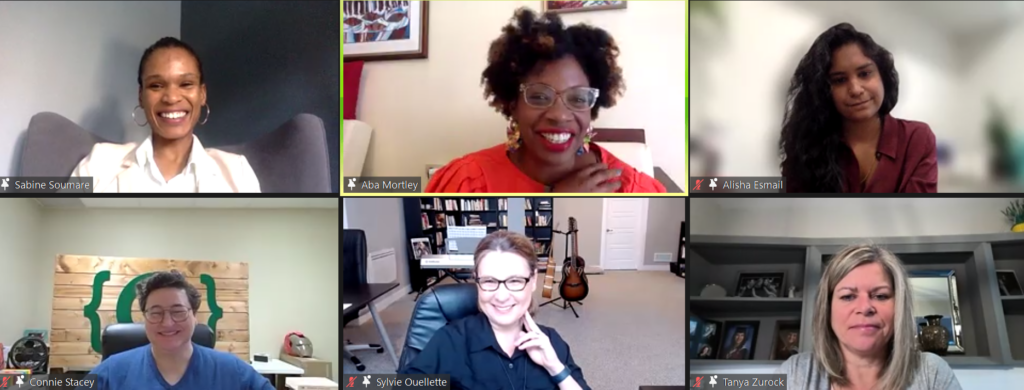The State of Women’s Entrepreneurship in Canada 2022
What are the barriers to success for women entrepreneurs in Canada, and what is being done at different levels in the ecosystem to advance inclusion? And, how does the Women Entrepreneurship Knowledge Hub (WEKH) contribute to the entrepreneurship ecosystem?
We took a deep dive into these questions and more at the launch of WEKH’s flagship report, The State of Women’s Entrepreneurship in Canada 2022.
The session opened with greetings from the Hon. Mary Ng, Minister of International Trade, Export Promotion, Small Business and Economic Development, and Arielle Kayabaga, Member of Parliament for London West.
“We know that women entrepreneurs have been facing systemic barriers long before the pandemic. As we support women entrepreneurs and business owners with our $6 billion Women Entrepreneurship Strategy, we are ensuring that our efforts are data-driven, and that best practices are shared across the country. Through the Women Entrepreneurship Knowledge Hub (WEKH), we are providing a one-stop source of knowledge, data, and best practices to help women entrepreneurs across the country succeed,” Minister Ng said.
WEKH Academic Director Wendy Cukier sat down with Minister Ng for a fireside chat about the Government of Canada’s commitments for women entrepreneurs, recent programs, and initiatives in place to support the ecosystem.

Attendees got a first look at The State of Women’s Entrepreneurship in Canada 2022 report as Wendy presented highlights from the new research.
“Entrepreneurship is a pathway to economic growth and an inclusive ecosystem is critical to supporting diverse women entrepreneurs and women entrepreneur are also more likely to help advance environmental and social goals,” said Wendy Cukier, founder of Ryerson’s Diversity Institute, who leads WEKH. “When we develop policies and programs we must apply a gender and diversity lens. Most of our entrepreneurial financing and support systems were designed by men for men.”
Growing their businesses through challenging times
Sabine Soumare, Executive Director of WEKH, led an insightful discussion with trailblazing entrepreneurs who shared their unique experiences of running and growing their business operations throughout the challenges of the pandemic.

Panelists included:
- Aba Mortley, Cher-Mere
- Alisha Esmail, Road Coffee
- Connie Stacey, Growing Greener Innovations
- Sylvie Ouellette, Versatil
- Tanya Zurock, Wild Prairie Soap Company
Panelists shared how support from different organizations – Government of Canada resources, private sector corporations, and local community groups and programs – helped set them up for success. Aba Mortley and Alisha Esmail advised other women entrepreneurs looking to start or scale their businesses to start with the resources available in their communities, which can introduce new contacts and pathways. “There are lots of programs there on the ground, I would say start in your community and find out who those programs and where those programs are, because they feed into bigger things and they can guide you to… where those opportunities are,” Aba advised.
Alisha agreed, adding “A lot of the local incubators or local hubs that are connected to what you guys are doing really helps with, not only community, but it could be where to find funding… It’s super helpful, from mentorship to funding opportunities.”
Sylvie Ouelette noted that a lot of support for her business has come through a partnership with IBM. She also commented on the role that professional organizations have played in her business networking: “I’m proud to say that we are a women-owned, Indigenous, and LGBTQ company so I am part of all the councils: WBE, CAMSC, CCAB, CGLCC. A lot of the networking is very good.”
Panelists reflected on the impact that the Government of Canada’s programs and supports have made. Tanya Zurock, founder of Wild Prairie Soap Co shared, “I can honestly say that, you know, receiving the Women Entrepreneurship Strategy Grant in 2019 really was a pivotal point for us. It helped us to scale up our manufacturing, buy new tanks, new scales.”
“A lot of the traction we’ve gained actually has come from some of the support of the Canadian Government… We have used the Trade Commissioner Service through Global Affairs, and if you’re not familiar with it, I strongly recommend you get involved with them,” said Connie Stacey.
Watch the session on-demand to hear more about the research presented by report author Wendy Cukier, panelist insights, and remarks from Minister Ng.
